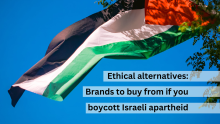This week, Palestine Solidarity Campaign (PSC) launched a major new campaign: Don’t Buy Apartheid. The campaign calls on all individuals, as well as shops, restaurants, cafés, and venues, to take two key actions in solidarity with the Palestinian struggle for freedom: boycott Israeli produce, and boycott Coca-Cola.
The campaign highlights how both Israeli agricultural companies and Coca-Cola work to uphold and enable Israel’s system of oppression against Palestinians.
Israeli agriculture boycott
Who Profits? research found that Israeli agricultural export companies, which supply the leading retail chains in the UK, operate farms, packing houses and other facilities in illegal Israeli settlements in the occupied West Bank. This makes the companies participants in the colonisation of Palestinian land and theft of resources, and they benefit from the Israeli state’s systematic attempts to destroy and dismantle Palestinian agriculture.
Trading with these export companies provides economic support for their role in supporting Israel’s colonisation and military occupation, with revenue contributing to the sustainability of illegal settlements. For this reason, Palestine Solidarity Campaign believes all fresh produce from Israel must be subject to boycott.
When out shopping for fresh produce, check the label. If it says ‘product of Israel’, or bears the name of an Israeli agricultural exporter such as Mehadrin or Hadiklaim, don’t buy it.
While Israeli fresh produce is being exported worldwide, Palestinian agriculture is under attack.
In the Gaza Strip, Israel’s genocide has devastated Palestinian agriculture, with analysis by the Food and Agriculture Organisation of the UN and the UN Satellite Centre showing that 75% of cropland has been damaged or destroyed, decimating local food production.
In the West Bank, Palestinian farmers face an intensification of attempts to drive them from their land by the Israeli military, working in coordination with armed Israeli settlers. These attacks ramp up during the annual olive harvest. Not only are hundreds of thousands of Palestinians reliant on the harvest for their subsistence, but the trees, grown and tended to across several generations, are central to Palestinian life, with communities working together to harvest the crop in the face of extreme harassment and violence.
Israel’s attacks on Palestinian agriculture are not limited to the Gaza Strip and West Bank. Palestinian Bedouin communities in the Naqab region are continuing to face down attempts to drive them from their land, including through the destruction of wheat and barley crops and the theft of livestock.





